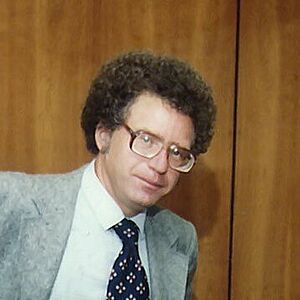Louis Friedman facts for kids
Quick facts for kids
Louis Friedman
|
|
|---|---|

Friedman in the 1970s
|
|
| Born |
Louis Dill Friedman
July 7, 1941 Kingston, New York, U.S.
|
| Education | University of Wisconsin, Madison (BS) Cornell University (MS) Massachusetts Institute of Technology (PhD) |
| Scientific career | |
| Fields | astronautics, engineering |
| Institutions | AVCO, The Planetary Society, Jet Propulsion Laboratory |
| Thesis | Extracting Scientific Information from Spacecraft Tracking Data (1971) |
Louis Dill Friedman, born on July 7, 1941, is an American engineer who loves space! He's an expert in astronautics, which is the science of space travel. He also talks a lot about space to people. Dr. Friedman helped start a group called The Planetary Society with famous astronomer Carl Sagan and scientist Bruce C. Murray.
Contents
Louis Friedman's Journey in Space Science
Early Education and Learning
Louis Friedman studied some really interesting subjects! In 1961, he earned his first degree in applied mathematics and engineering physics from the University of Wisconsin, Madison. He then went on to get a master's degree in engineering mechanics from Cornell University in 1963.
Later, in 1971, he earned his highest degree, a Ph.D., from the Massachusetts Institute of Technology (MIT). His special project for this degree was about Extracting Scientific Information from Spacecraft Tracking Data. This means he learned how to get important science facts from the signals sent by spacecraft.
Working with Space Missions
Before joining the space agency, Dr. Friedman worked for a company called AVCO Space Systems Division from 1963 to 1968.
From 1970 to 1980, he worked at the Jet Propulsion Laboratory (JPL). JPL is a famous center that builds and operates robotic spacecraft for NASA. At JPL, he led teams that studied planets and worked on the Viking missions to Mars.
He also helped with many other exciting space projects at JPL, including:
- Mariner 10: A mission that flew by Venus and Mercury.
- Voyager: The amazing missions that explored the outer planets like Jupiter and Saturn.
- Magellan probe: A spacecraft that used radar to map the surface of Venus.
- Projects related to Halley's Comet, including ideas for a solar sail.
- Many parts of the Mars Program.
Exciting Space Projects and Ideas
Louis Friedman has been involved in many cool space projects and has shared his ideas through books and speeches.
- He wrote a book called Human spaceflight: from Mars to the stars in 2015. It's all about how humans might travel to Mars and beyond.
- He also wrote Star Sailing: Solar Sails and Interstellar Flight in 1988. This book explores the idea of using giant "sails" pushed by sunlight to travel through space.
- He was the project director for the Cosmos I mission. This was a special project by The Planetary Society and Cosmos Studies to test a solar sail in space.
- He was part of the team that worked on the Mars Balloon and Mars Rover projects for The Planetary Society. These projects looked at new ways to explore Mars.
- Because of his knowledge, he was asked to help review American and Russian space missions for government groups.
- He has also shared his thoughts in articles and speeches, like "Think Bigger About Mars" and "A Space Nerd Responds."
Space Organizations and Groups
Louis Friedman has been a part of many important space and science organizations:
- The Planetary Society: He was the Executive Director of this group, which promotes space exploration and research. He also wrote for their magazine, the Planetary Report.
- Sigma Xi: A scientific research honor society.
- American Astronautical Society: A group for people interested in spaceflight.
- American Association for the Advancement of Science: A large science organization where he is a Fellow.
- American Institute of Aeronautics and Astronautics: A professional group for aerospace engineers and scientists. He was a Congressional Fellow with them from 1978-1979.
 | William Lucy |
 | Charles Hayes |
 | Cleveland Robinson |

